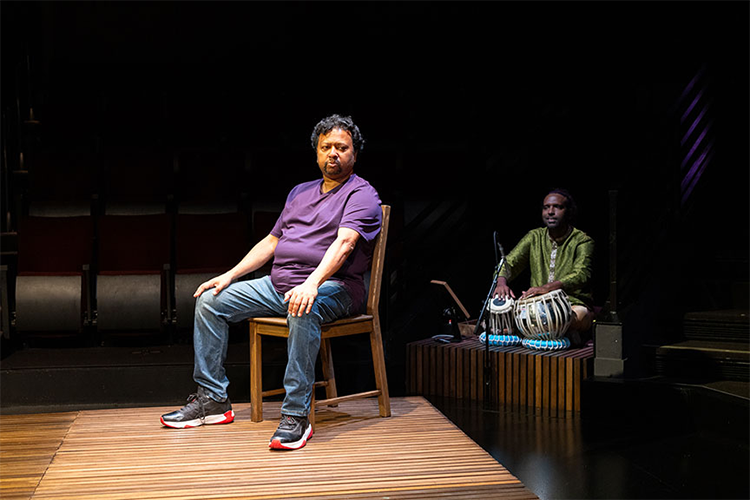
By Sandi Masori

SAN DIEGO — Normally when you think of seeing a play, you think of the traditional theater arrangement of a stage in the front and rows of seats facing the stage. This gives you three walls for the set, and the audience becomes the fourth wall. The Old Globe also has another type of theater, and that’s the theater-in-the-round. This means that the stage is in the center of the room and the audience is all around it. It takes special planning and blocking to do a show on this type of stage, but they pull it off with Dishwasher Dreams.
When I first learned that Dishwasher Dreams was a one-man show (featuring Alaudin Ullah), I thought “hmm I wonder how he’ll do that,” and then when I learned it would be in the theater-in-the-round I was really curious how he would do it.
The show opens with acclaimed tabla player Avirodh Sharma sitting on the floor in the corner off-stage, playing the tabla- a kind of percussion instrument. His charismatic smile and expressive eyes quickly engage the audience and get them clapping along to accompany the rhythms he sets. And while you watch him play, you may think that he is the actor, and wait for him to start talking. He is so engaging that you may not notice that someone else has taken the stage. But as the lights shift from the corner to the center, the invisible curtain rises on Ullah.
The stage is bare except for a single chair. The show is 90 minutes with no intermission. And yet Ullah was able to entrance the audience from the very first word.
The show is really a kind of stand-up comedy, except that while there is plenty of laughter, he’s also leading you on an emotional journey as he recounts his parents experience emigrating from Bangladesh to Spanish Harlem in New York, the land of the free. As he retells the story of his parents’ immigration, and his own story of growing up as a first-generation American (New Yorker), he moves from square to square on the stage. In this way he is able to make everyone in the theater focus on him- whether he is facing them or not. As he verbally moves from India to New York, and from the restaurant where his dad was a dishwasher to the apartment where they lived, he physically moves around the stage, sometimes taking his chair with him to use as a prop. Director Chey Yew did a masterful job of directing the use of the space.
Ullah recounts his own experience of being a brown actor in Hollywood in the 90s, his love of the Yankees, what it was like visiting his family back in Bangladesh as a child, and growing up in Spanish Harlem.
The audience learns something about the discrimination that both he and his father faced. We learn about the difficulties of trying to get parts when the only parts for brown people were of terrorists and gangsters, of how he landed a dream audition for a major movie, but then realized he didn’t want to play parts that demonized Muslims anymore, though at that time there were very few other parts to be had.
And through it all, he manages to keep the audience entranced, laughing, sighing, even getting misty-eyed at all the right places. All the while Sharma is accompanying and punctuating Ullah’s words on the tabla. For many in the predominantly white audience, it was eye-opening and empathy building. As we walked out of the theater, I heard people telling one another how much they learned and how interesting it was to hear his perspective.
As for the Jewish angle, there was none, as was expected for this show. The Globe’s Artistic director Barry Edelstein did write in the notes for the program how these stories reminded him of his own family’s stories of being poor Jewish immigrants in the 1920s and how the experience, while different, was also in some ways much the same. Just like it’s important for us to remember and recount our own stories, it’s also important for us to hear the stories and experiences of others. That is how we can build bridges that take us out of our insular lives and understand the trials and triumphs of others who share this small plot of land we call Earth.
Ullah does a great job of entertaining, educating, and perhaps most importantly, making you care.
The show plays at the Old Globe through October 15th.
*
Sandi Masori is a food and theatre reviewer for San Diego Jewish World. When she’s not covering food or theatre, she helps authors self-publish, hangs out with her kids, and searches for the best sushi in town.